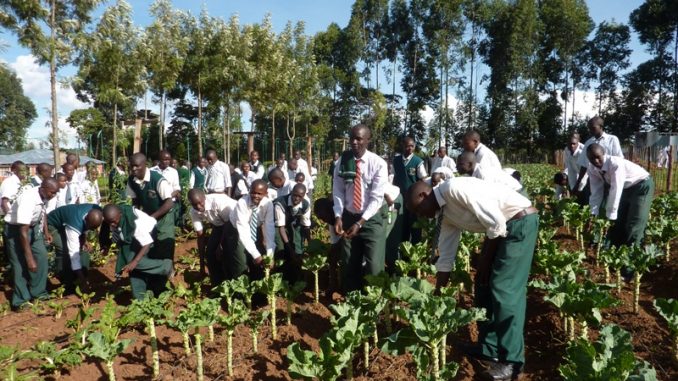
|
|
|
PRESS RELEASE |
|
World Food Day: African Development Bank (AfDB) urges African leaders to make agriculture attractive to young Africans and stem migration |
|
“We must get youths into agriculture and see it as a profitable business venture not a sign of lacking ambition”- Akinwumi Adesina, President of the African Development Bank |
|
DES MOINES, United States of America, October 17, 2017/ — On the occasion of the 2017 World Food Day, the African Development Bank (www.AfDB.org/en) has highlighted how Africa’s food security depends on attracting young people to agriculture and agribusiness. The sector can potentially create wealth and employment for African youth, thereby stemming migration.
World Food Day, celebrated yearly on October 16, promotes worldwide awareness and action for those who suffer from hunger and the need to ensure food security and nutritious diets for all. This year’s theme focuses on the need to ‘Change the future of migration; Invest in food security and rural development’. The AfDB’s ENABLE Youth program, which grooming a crop of young agriculturists, is on course to make this happen. Mahmud Johnson, 26, is the Founder of J-Palm Liberia which works to improve income for Liberia’s smallholder oil palm farmers by 50-80%. He is also creating additional jobs for over 1,000 young people to work as sales representatives for his products. “Despite the tremendous odds, we (African youth) are determined to maximize our abundant agricultural resources to create wealth, jobs, and socioeconomic opportunities in our countries and across the continent. We need our stakeholders to view us as serious partners in Africa’s transformation, and to work with us to expand our enterprises,” Mahmud said. Mahmud and some of his employees have benefited from capacity building programs under the AfDB’s Empowering Novel Agri-Business-Led Employment for Youth initiative. Like Mahmud, many African youth are passionate about staying back on the continent to create wealth and employment, if given the tools and opportunities to put their skills to use. Under the ENABLE Youth program, the Bank is working with the International Institute for Tropical Agriculture (IITA) to develop a new generation of young commercial farmers and agribusiness entrepreneurs. “Our goal is to develop 10,000 such young agricultural entrepreneurs per country in the next 10 years. In 2016, the Bank provided US $700 million to support this program in eight countries and we’ve got requests now from 33 countries,” said Adesina. The Bank considers investment in agriculture as key to making Africa youths prosperous, thereby stemming the tide of migration. This goal, and theme of 2017 World Food Day, are well aligned with two of the AfDB’s High 5 (http://APO.af/6D641c) development priorities – Feed Africa (http://APO.af/FN7bfw) and Improve the quality of life for the people of Africa (http://APO.af/Yfi5Fw) – said Jennifer Blanke, Vice-President, Agriculture, Human and Social Development at the AfDB. “A thriving business sector in Africa will provide the jobs and returns that will attract and retain Africa’s best talent on the continent, while improving the quality of life of all Africans,” she said. With more than 70% of Africans depending on agriculture for their livelihoods, it is imperative for the sector’s full potential to be unlocked, and by doing so help to vastly improve the lives Africans. Accordingly, one of the goals of Feed Africa is to eliminate hunger and malnutrition by 2025. Due to the finite nature of mineral resources such as gold, diamonds, crude oil, among others, African countries must diversify their economies. This cannot be done without a significant emphasis on agriculture given that the great majority of Africans depend on it for their livelihoods. Increased food demand and changing consumption habits driven by demographic factors such as urbanization (internal migration) are leading to rapidly rising net food imports, which will grow from US $35 billion in 2015 to over US $110 billion by 2025 if trends are left unchecked. Given that African smallholder farmers are on average about 60 years old, Africa’s food security depends on attracting young people into agriculture and agribusiness and empowering them. Governments can support these shifts through the right enabling environments via policy reforms for increased private investment in agriculture and agribusiness. And also by better articulating the importance of agriculture for their economies in their interaction with the public. “Food security, rural development are closely interlinked with issues of migration, fragility and resilience. The Horn of Africa and the Sahel provide compelling examples of how global factors such as food insecurity, radical extremism and migration reinforce state fragility and have devastating effects on development,” said Khaled Sherif, AfDB Vice-President for Regional Development, Integration and Business Delivery. “The lack of economic opportunities, infrastructure, employment opportunities and unpredictable climactic changes in these countries are key sources of fragility that often times result in the forced migration of peoples seeking a desperate alternative. The Bank has, where appropriate, adopted risk-based approaches at both country and regional levels in addressing fragility.” Ahead of the World Food Day, the AfDB joined Côte d’Ivoire’s Minister of Agriculture and Rural Development and other developing partners on October 14 in a day-long set of activities to promote agriculture as a business. They emphasized the need for governments to invest in agriculture to create jobs and stem the flow of migration that has undermined the security and economies of African countries. For more on the World Food Prize/Borlaug Dialogue events, please visit: http://APO.af/EXgmf3 and http://APO.af/lVEF8k.
Distributed by APO on behalf of African Development Bank Group. Media contacts: Emeka Anuforo About the African Development Bank Group: |



